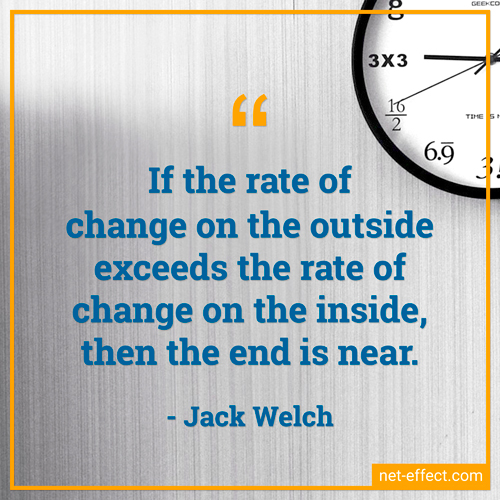Meet Chris Becker, NetEffect CEO
 Chris Becker is an experienced consultant and entrepreneur with a background in international consulting, managing new business startups and driving large impactful corporate change initiatives. As the CEO of NetEffect, his focus is on digital transformation. This includes identifying opportunities for companies to change the way they do business by leveraging the power of web, mobile, and other emerging technologies.
Chris Becker is an experienced consultant and entrepreneur with a background in international consulting, managing new business startups and driving large impactful corporate change initiatives. As the CEO of NetEffect, his focus is on digital transformation. This includes identifying opportunities for companies to change the way they do business by leveraging the power of web, mobile, and other emerging technologies.
We caught up with Chris to learn how he works with both large corporations through to small technology startups to analyze, discover and apply innovative ways to leverage technology to improve performance, team interaction, quality of outputs and speed of action. Connect with Chris on LinkedIn here.
NetEffect helps large organizations think and act more like startups. What experience has given you the skills and insights to provide these types of services?
Early on, my focus was in organization design and change management. This has proven to be a solid foundation of concepts and tools when looking at how to help an organization be nimble, while still being mindful of how to effect change in organizations with thousands of people, a range of products and services, competing priorities and functions, and complex business processes.
While we talk a lot about technology, most of the challenges arise in the use of that technology to enable business process and to equip people with new ways of working. Anyone can get the technology perfect, and still fail on execution due to lack of attention to large organization dynamics and the changes affecting people. Even a well-conceived strategy can be lost in the minefield of execution.
Organizational priorities, the complexity of work, evaluating and positioning talent, and organization design all need to align with technology innovation and disruption. The result requires a more holistic effort, but the payoff is form and function coming together to create sustainable business value and advantage.
This approach has provided a solid starting point to enable our technology team to build compelling experiences and solutions. NetEffect can be described as a powerful blending of consulting, digital agency and product development capabilities.

Specifically, what kind of companies have you worked with and where do you provide support?
We have a broad team with experience in a range of geographies, industries and organization types. Organization design and change management was an early focus and has now become a part of almost everything we do. Since 1995, this has included the financial services (e.g. VanCity and Coast Capital credit unions in British Columbia, Goldman Sachs, Sun Life Financial), energy (e.g. EnCana), automotive (e.g. Nissan) as well as professional services, NGOs and retail (e.g. Canadian Tire, Hudson’s Bay).
Our focus now is on large scale change in complex organizations with a particular concentration in financial and professional services. Complexity is not just size. It can be driven by geographic coverage, product range, brand equity and innovation and organizational models. Organizational models for example, have expanded greatly over the past 20 years:
- More collegial and partnering networks for organizations
- Independent contractors and agents versus traditional captive employees
- Loose affiliations between complementary companies
- Joint ventures and strategic alliances
- Complex vendor/sub-contractor relationships and more.
At NetEffect, we are utilizing these new working models to adapt and learn, and equip us with more versatile ways to work so we can bring these types of models to our clients. This can greatly increase client focus on core capabilities while building in expertise and speed through these other models. Greater flexibility to engage external expertise and capabilities help bring fresh perspectives to large organizations that often rely on their own internal functions and teams which can often result in them losing sight of the dynamics in the marketplace. The emergence of ‘Software as a Service’ is an example of alternative models for leveraging best in breed applications and technology. Change must be a continuous improvement process of self-examination and growth that can often be painful.
Recognizing how interconnected strategy is with execution helps ensure the real business need is always kept front and center when working on the necessarily deep technology efforts. Too often, technology is left with abdicated authority to make a change which inevitably leads to lost value and failed efforts. With the rise of nimbler, technology-enabled competitors, large organizations do not have time to repeat mistakes and restart efforts over and over.

We’ve had the chance to work with clients from the point where the strategy is defined but requires articulation to drive it down to meaningful words, phrases and themes that are going to matter to the people on the ground. These often expand to projects or programs that are designed to rally people within the organization to a common cause and move quickly. Having a clear starting point at this stage can make all the difference when moving to designing, building and implementing a solution – be it a new product, new ways to interact with the market, or innovative ways of working.
When you then combine strong technical and operational capabilities, including partnerships with best-in-breed software, you have a powerful combination to provide strategic execution capabilities to large organizations struggling to keep pace with new, smaller competitors that have a greater impact on industries over time.
What prompted your transition from a consultant to an entrepreneur?
Sooner or later you have to practice what you preach and eat your own dog food! Consulting from an early age was a great chance to see a wide range of organizations in action. Eventually my words sounded hollow without the sense of ownership and weight of responsibility that comes with accountability for outcomes.
So, around the mid- 2000s, I worked with a small team on a social media startup. As CEO, I led a team building a ‘User Generated Content’ Software-as-a-Service (SaaS) platform. We worked with media companies, large brands, and agencies to leverage, monetize and engage consumers in user-generated content. We successfully sold that business in 2015.
What followed was a powerful and somewhat unique perspective, combining complex organization consulting with the scrappy world of bootstrap startups. This is the spirit around which we’ve built NetEffect.
So the transition was gradual and I’d say it’s now a less of a transition and more a combination.
Consulting is embarking on a discovery process of getting to know and understand a business’s issues, and coming up with ways to solve those issues in new and innovative ways. From that perspective, consulting provides a wealth of ideas to help entrepreneurs figure out ‘what problem they are solving’. So in many ways, consulting and entrepreneurship are tightly interwoven.
